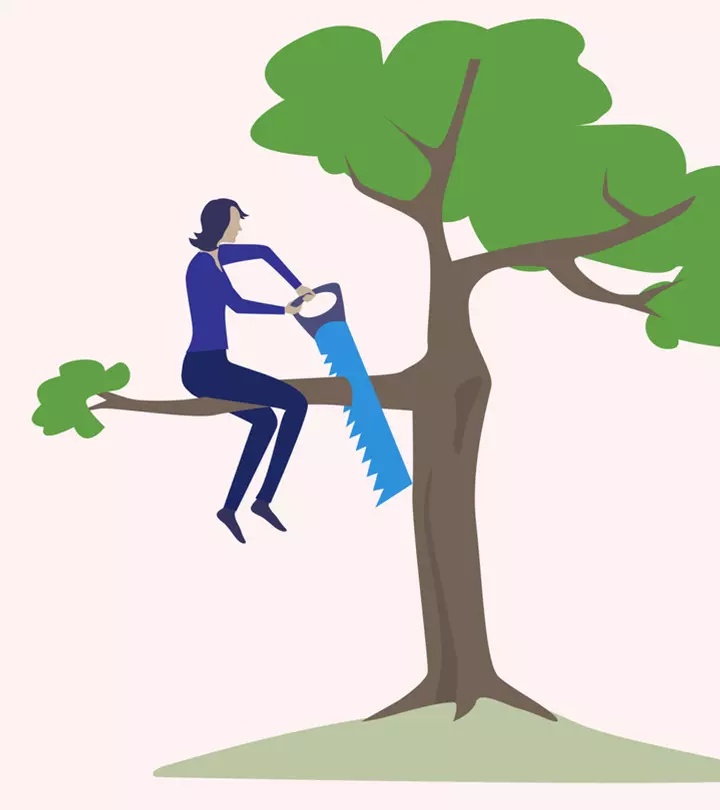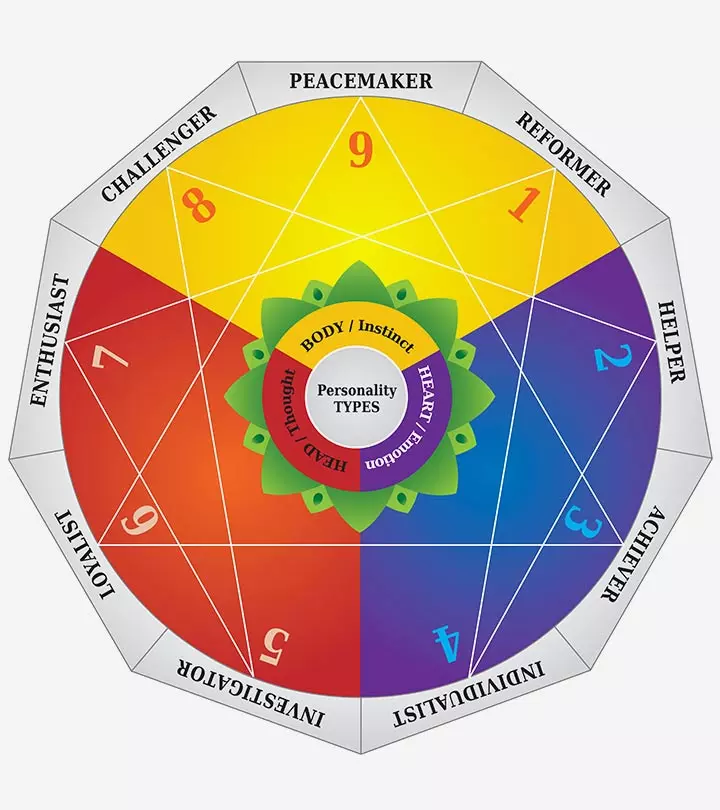Trust Issues: How To Identify, Signs, & How To Overcome Them
Have some faith and see things from your partner's point of view to rebuild your bond.

Image: Shutterstock
Trust issues often start when someone experiences betrayal, such as infidelity or after losing a partner. Pistanthrophobia or the fear of trusting people does not happen overnight. It can result from over-expectations and bad experiences you have had in the past. During this phase, you tend to constantly question your partner’s moves and be suspicious of them.
So, how do you find out if you are losing trust in your partner? What is the way forward? In this article, we have put together some important signs of distrust and the best ways to overcome them. Keep reading!
In This Article
Where Do Trust Issues Come From?
Trust is the act of putting our faith and confidence in another person. But some people have trouble putting their faith in others. These trust issues may stem from a variety of reasons:
- A Toxic Childhood
Parents who are strict, or who believe their child is lying, or who tend to control their children can cause a child to grow up with trust issues. The child has seen very little pleasantness and faith growing up and knows no other way.
- Child Abuse
Children who have been mentally, verbally, or physically abused in their childhood at the hands of their family members or close friends and relatives experience severe trauma. This trauma causes them to doubt themselves and lose faith in everyone. They shy away from trusting anyone or avoid getting close to anybody.
- Lying Parents
A child who has grown up seeing their parents constantly lying to each other can begin to justify lies. The child learns to think that lies are a way of life, whether for good or bad. They start lying and also believe that everyone else is lying.
- Separated Parents
Watching parents go through a divorce or play the blame game can affect the child negatively. The child stops trusting anyone and starts believing in blame games. They also tend to believe that the other person is not telling the truth. They grow up becoming defensive and feel they will be blamed in every negative situation.
- A Bad Break-Up
If a person has gone through a bad break-up, it could manifest into mistrusting further relationships. This is more likely to happen if he/she has been lied to or betrayed – and they could find it difficult to trust anyone again.
These episodes in the past can lead to certain behavioral or thought patterns that can lead to trust issues. Let us see what they are.
What Are Trust Issues Associated With?
Alongside past experiences, there are some behaviors and personality traits that may lead to trust issues. Going through the following traits can help identify signs of trust issues in yourself or in others.
- Prejudice
Prejudice is a form of pre-judging someone based on the beliefs one has grown up with. Some of these preconceived notions curb a person’s ability to trust and disable them from looking at things from the other person’s perspective.
- Depression
Trust issues can cause depression. It is not pleasant for someone to constantly think of the worst-case scenario or carry a feeling of being betrayed. Sometimes, mistrust reaches a point where the person understands that they have a problem but cannot take control of it. This leads to a feeling of a lack of self-control and can wreak their peace of mind.
 Trivia
Trivia- Lack Of Self Confidence
Questioning or doubting one’s self-worth can be associated with trust issues. If one cannot trust themselves or has no confidence in their own self-worth, they will be unable to see what others see in them. This becomes a cycle causing further lack of confidence.
 Quick Tip
Quick Tip- Incapability To Commit To A Relationship
Those with trust issues could be incapable of building a trustworthy, happy, and fruitful relationship. Be it parents, friends, coworkers or partners, building a healthy relationship is almost impossible if one cannot put their faith in people and their intentions.
- Self-Sabotage
A severe case of trust issues can feed into a person’s daily life and cause them to sabotage their own growth process. The mind constantly concentrates on the actions of others towards them and forgets to nourish the self. This could lead to depression and associated near-fatal physical and mental health problems.
- Intimacy Issues
Some people may be uncomfortable with their bodies and have intimacy issues. They don’t love themselves, and hence cannot believe someone else would. They, in turn, could sabotage their sexual relationship.
- Isolation
Someone with trust issues tend to isolate themselves and also become secretive about their own lives. They fear letting anyone into their life completely.
- Fear Of Abandonment
On the other hand, some people have experienced isolation or abandonment and hate it. They detest the feeling of being left behind by someone they trusted so much that they’d rather be alone than trust someone new and get attached to them only to be abandoned again.
Do you feel you have trust issues? Or is someone you know exhibiting such issues? How can you know for sure?
Signs Of Trust Issues
- Fact-Checking
If your partner does not take your word and is in a habit of cross-checking all the facts, it sure is a sign of mistrust. They don’t want to believe you till they don’t confirm it for themselves.
- Expecting The Worst
If someone is always looking at the negative side of things and expecting the worst out of every situation, they have a serious trust problem. They expect everyone to betray them and are unable to give their 100% to any friendship or relationship.
- Keeping A Distance
Even though they crave love and companionship, a person with trust issues will always keep people at a distance. They are scared to open up or be truthful about things because they are always wary of the person in front.
- Jealousy
A very blatant sign of mistrust is jealousy. If your partner is jealous of everyone you are close to, be it the same gender or otherwise, it could manifest in a bad way in the relationship. The jealousy is not always about another man/or woman but could also be about you spending time with your family or old buddies or colleagues. As a result, your partner may isolate you from the rest of the world, keeping you all to yourself. They will also force you to tag them along wherever you go, so they can keep track of your circle and ensure that you aren’t cheating on them.
- Looking For Ulterior Motives
If a person is constantly suspecting people of having ulterior motives, then he/she can never trust another person. They have a problem taking people at face value and believe everyone is trying to take advantage of them. Consequently, a jealous person questions everything around them as they don’t trust anyone.
- Overthinking
Overthinking a situation, especially with a negative mindset, and playing situations in one’s head that are unlikely to occur are all signs of mistrust. For example, when a partner has been gone too long, the other starts overthinking. They imagine the worst, such as them being out cheating.
- Snooping
Checking their partner’s phone or messages, eavesdropping on conversations, or going through their belongings are signs of mistrust.
A survey conducted on 1,106 U.S. citizens showed that 15% admitted to reading their significant other’s text messages every day, while 23% reported doing so once a week or more. In contrast, the majority, 59%, claimed never to read their significant other’s text messages without permission. These findings shed light on privacy and boundaries in relationships. Do look out for such signs of mistrust
Ronald Hoang, Relationship And Family Counselor says, “Many people believe that full transparency gives way to trust, but it also gives way to surveillance. Trust is about being able to sit with uncertainty. Trust is built in drips and lost in buckets.” Dealing with trust issues can be difficult, but it sure is worth it. We discuss the tips on how to overcome trust issues in the next section.
Dealing with trust issues can be difficult, but it sure is worth it. We discuss the same in the next section.
How To Deal With Trust Issues
- See A Therapist
Trust issues can sometimes be deep-rooted in one’s childhood or a bad breakup from a long relationship. The issue may have remained for years, and with age, it could resurface. In such a case it is advisable to see a therapist or psychologist. Talking to a professional will help bring out the crux of the issue. Once the inception of the problem is addressed, a solution will not be far.
 Trivia
Trivia- Group Therapy
Group therapy sessions allow you to find camaraderie in others struggling with similar issues and trying to achieve the same goals as you. These sessions are beneficial as you are given questionnaires that help you recognize and accept your problem. Speaking to like-minded people will make you feel understood and validated.
- Introspection
Introspect, meditate, pick hobbies, and work on personality development. Love yourself and your life and work on improving your self-esteem. When you see your worth, you will stop doubting others’ goodness towards you.
- Processing Past Pain Points
Awareness and acceptance help you win half the battle. Processing and understanding a painful incident of betrayal or abuse from the past will set you free. Re-living the bad experiences is only harmful to your mind and body. Some people tend to shut out bad experiences and live in denial. It is important to recognize the pain points and address them as necessary. If the issue runs too deep, it is advisable to see a therapist.
- Take Risks
Even if the mind is not ready to trust, sometimes you have to take a risk and take the plunge. Accept that everything will not run to perfection and every relationship will have risks. Be careful and wary but do not shut yourself off completely. Ronald adds, “Trust is built by negotiating between safety and risk. Trust comes from being in a safe space and learning trust. It also comes from being able to take risk, and move beyond that risk to build trust.”
- Acknowledge Trustworthy Acts
You believe trust has to be earned. This works both ways. So, if someone does something to gain your trust or that proves them trustworthy, acknowledge the act to yourself and to them. Brick by brick, one act at a time, you can build a strong wall of trust with a person close to you.
- Treat Individuals Separately
Avoid judging one person by another’s actions. If you have been betrayed in a previous relationship, do not expect the next person to do the same. Every personality is different – so respect a person for their qualities and do not attach someone else’s shortcomings to them. Try to compartmentalize each individual for their personality and relationship.
- Stick To Evidence
This may sound like it is okay to be snooping around for evidence. But no – what it actually means is to believe in what is in front of you. Get out of the fantasy world in your head that keeps building stories of what may or may not be. Look at the positive reality in front of you. The more you cook stories in your head, the less you may tend to trust.
- Don’t Project Your Mistrust
Sometimes, you can’t trust anyone because you yourself indulge in distrustful activities. Since you know you are not trustworthy, you project that unworthiness onto others. Stop doing that. Work on yourself.
- Identify Triggers
Some situations can trigger you more than others. Identify such situations. If a partner travels on a business trip often, or if a friend turns down your invite a few times in a row, these situations get your mind running for the probable cause of their denial. You only would start overthinking about what the reasons may be. Identify the situations that cause you maximum discomfort and have an open conversation with your partner or friend.
- Reduce Your Expectations
Our expectations are what cause trust issues. When someone is not doing things in ways we perceive, we tend to question their actions and motives. Reduce your expectations and allow the person to be themselves and react according to their own comfort.
- Accept People Have Flaws
You can’t expect everyone to be perfect or live as per your rules of perfection. If someone has done something to trigger you, try to forgive them and move on. Accept that others’ actions are their responsibility and your reaction to them is yours.
- Recognize Self-Sabotage
Stop for a moment when your mind is racing or pushing you towards self-sabotage. Take a moment to meditate or calm your mind. Take baby steps and try to divert your mind to something else.
- Practice Role Reversal
Try to put yourself in the other person’s situation and analyze how you would behave. You will often find no problem in their actions and find justification in your mind about what is happening around you.
Trust issues in an individual may have roots in a traumatic childhood or infidelity in past relationships. These issues are toxic for any relationship, romantic or otherwise. They manifest in the form of jealousy, overthinking, and snooping on the partner. One must be secure with oneself to develop trust in relationships with others. Therapy is a great way to build better versions of ourselves, which consecutively brings about peace in our relationships with other people. Other ways to build trust in a relationship are identifying your triggers, acknowledging your partner’s trustworthiness, and taking risks when necessary.
Frequently Asked Questions
Is having trust issues a mental illness?
Trust issues have been linked to mental disorders like depression and paranoid personality disorder (2).
Are trust issues a red flag?
Yes, trust issues can be a red flag. Lack of trust in one’s family and loved ones may create issues within the relationship. It is best to talk to a therapist to help you understand the root of your issue.
Should you date someone with trust issues?
Yes, you can. It is not easy for them and it has nothing to do with you. Be patient with them and support them. Seek professional help to address their issues and support them on their healing journey.
Can a relationship work after trust is broken?
Yes, it is possible for a relationship to work after trust has been broken. Keep in mind that the decision to work on the relationship should be agreed upon by both partners. Building trust will not be easy and will not require a lot of work.
Key Takeaways
- People may develop trust issues after negative experiences like bad parenting, difficult childhood, a bad breakup, and infidelity.
- Such individuals tend to overthink and doubt everything. They always look for ulterior motives in whatever their partners or others say.
- Putting yourself in the other person’s shoes and analyzing their perspective may help build trust. Seeing a therapist can also help.
If you’re grappling with trust issues in your relationships, this video provides 6 valuable tips on how to effectively deal with them for your peace of mind. Check it out to nurture healthier connections all around.
References
Articles on StyleCraze are backed by verified information from peer-reviewed and academic research papers, reputed organizations, research institutions, and medical associations to ensure accuracy and relevance. Read our editorial policy to learn more.
- The neuroanatomy of social trust predicts depression vulnerability
https://idp.nature.com/authorize?response_type=cookie&client_id=grover&redirect_uri=https%3A%2F%2Fwww.nature.com%2Farticles%2Fs41598-022-20443-w - Paranoid Personality Disorder
https://www.researchgate.net/publication/318236128_Paranoid_Personality_Disorder
Read full bio of Ronald Hoang
Read full bio of Sneha Tete
Read full bio of Asmita De
Read full bio of Gracia Odile




























Community Experiences
Join the conversation and become a part of our empowering community! Share your stories, experiences, and insights to connect with other beauty, lifestyle, and health enthusiasts.